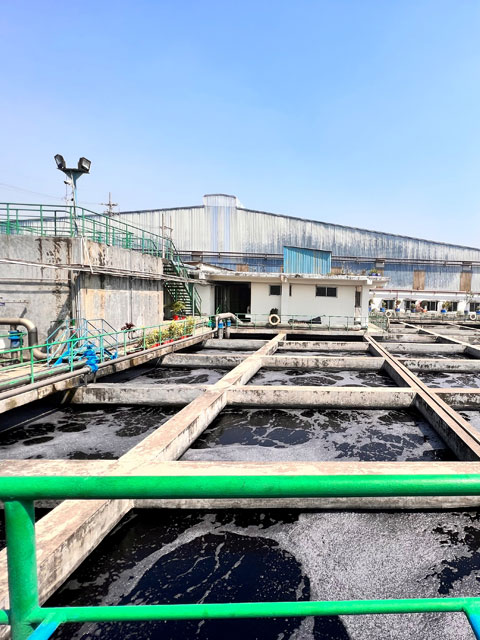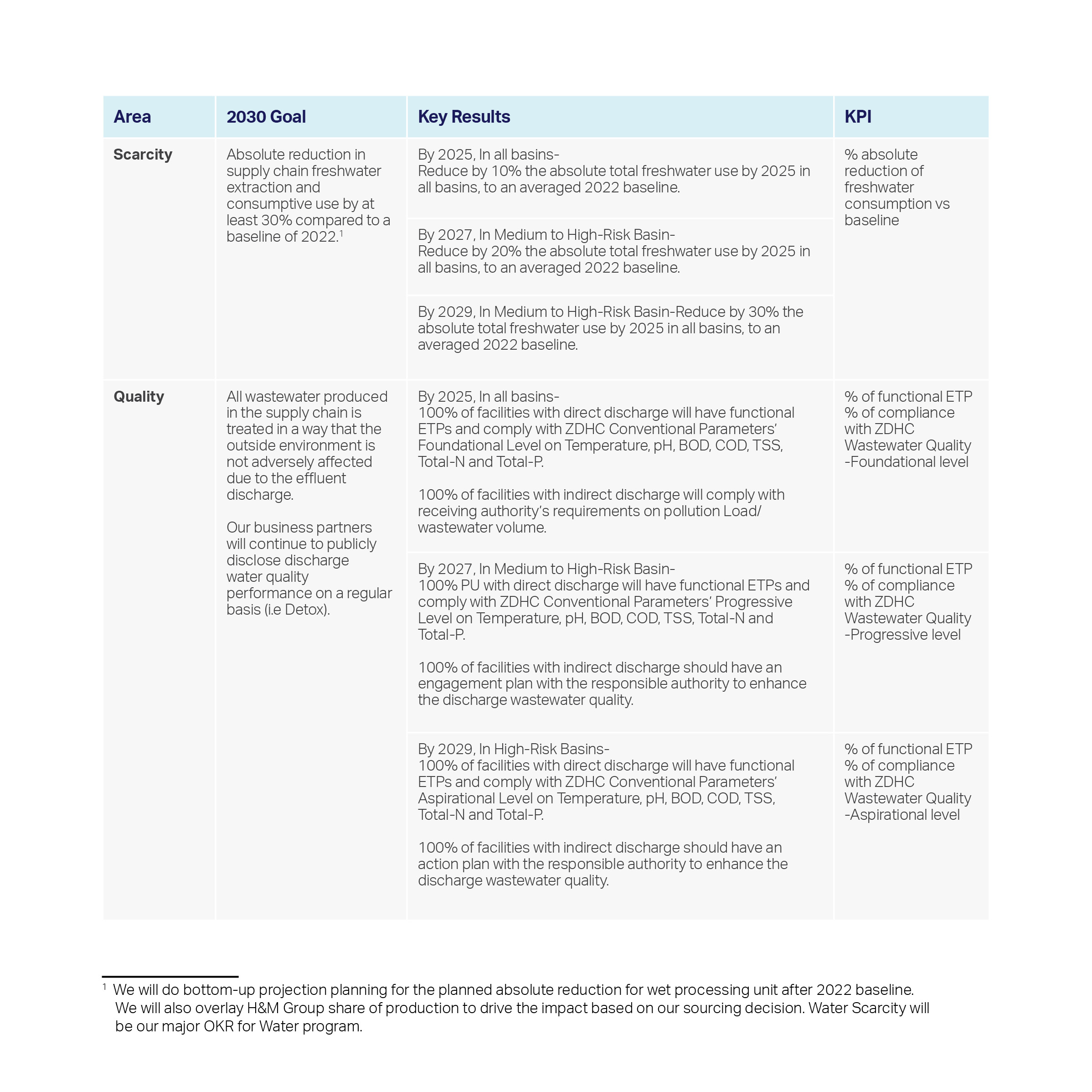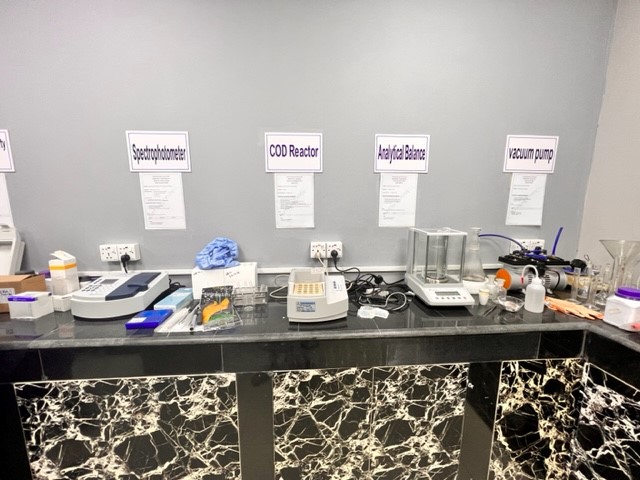
H&M Group Wastewater Zero Ambition
Explore moreH&M Group is a family of brands and businesses, driven by the desire to make great design available to everyone, in a more sustainable way. H&M Group offers fashion, design and services that inspire and enable people to express their style while making it easier to lead more circular lives.
About the H&M Wastewater Zero Ambition
The fashion industry is one of the biggest users of water, from the production of raw materials to washing and dyeing fabrics. Therefore, we have a responsibility to conserve, reuse and recycle water where possible and to minimize pollution to keep water clean for future generations. Our vision is to have a positive impact on water by 2030.
We want to build a business that is resilient to water crises and catalyzes innovation to enable the fashion industry to decouple from water. H&M Group has committed to water stewardship actions aligned with H&M Group’s Water Strategy 2030 for the whole value chain where we have significant freshwater impact.
Management of wastewater in our value chain is one of our core water focus areas. By 2030 we aim for all wastewater produced in the supply chain to be treated in a way that the outside environment is not adversely affected by effluent discharge.

Most of our wastewater impact comes from our supply chain: our business partner’s direct operations. Therefore, we shape our water program to enable our business partners to demonstrate better performance both in terms of reducing freshwater consumption and improving water quality. We expect our business partners to act on shared water challenges through setting contextual targets which should be achieved by 2030.
Water quality
Our Water Roadmap 2018-2022 laid out our goals and actions. It addressed the issue of access to clean water through reducing pollution in our supply chain to improve water quality. Our goal for 2022 was to have all our suppliers with on-site water discharge meeting our functionality assessments and complying with Zero Discharge of Hazardous Chemicals (ZDHC) foundational wastewater guidelines in their Effluent Treatment Plants (ETPs). For transparency, we have been publishing our key water milestones and results in H&M Group’s Sustainability Report.

Despite big improvements in this area, we didn’t manage to achieve our 100% goal. By the end of 2022, 90% of our suppliers with on-site ETPs meet functionality assessment, and 98% of our suppliers were meeting the foundational level of ZDHC wastewater discharge quality standard.
We didn’t meet our quality goal due to inadequate monitoring and operational control, and lack of appropriate competence. We are working with our business partners and stakeholders to build capacity and raise awareness.
In addition, we are actively addressing wastewater quality in our supply chain with improved treatment technologies, management of input chemicals and solutions for a more efficient use of dyes developed in the industry.
In 2023, while we transition to our long-term Water Strategy 2030, our relevant goals on scarcity and quality are:

Water availability
As part of our 2018-2022 Water Roadmap, our actions for wastewater recycling solutions were piloted and implemented in textile production processes. Instead of taking water and discharging it, we worked with our suppliers to recycle treated wastewater back into the production process.
15%
2022 goal – planned
15% of water used in production
process to be recycled
20.7%
2022 goal – achieved
we went beyond planned goal.
20.7% of water of the
total production water
consumption was recycled
GHG impact of wastewater management
H&M Group’s approved Science Based Target (SBT) on climate does not specify the share of greenhouse gas emissions coming from wastewater treatment plant operation and energy consumption. We will address this in two ways in the future:
- Working with our business partners to implement a climate target following SBT methodology, which covers all their operations.
- Piloting and supporting innovation around treatment technologies with lower energy consumption.
H&M Group has been working on managing wastewater in our supply chain for almost a decade with the following key actions and aspirations:
- We have strengthened the backbone to ensure that discharged wastewater meets industry standards or legal standards, whichever is stricter. We have done this by ensuring that there are technologically sound treatment systems in facilities, and that they function correctly. H&M Group has a robust framework to ensure ETP functionality with regular on-site visits and water quality testing.
 H&M Group
H&M Group
- We focus on building the awareness of our supply chain partners on the importance of wastewater management so that their actions align with our ambitions. We recognize that there are still issues around achieving higher quality standard (i.e. color) in the textile supply chain, but we continue to engage with business partners, chemical manufacturers and suppliers, and industry platforms to seek solutions in a collaborative way.
- Water challenges cannot be addressed by a single company. Industry collaboration is essential. At basin level, textile brands, industries and other stakeholders can come together to improve water availability and quality by improving water management, related regulations and governance frameworks.
Key lessons learned on the “Wastewater Zero” journey
- Circular water use or water recycling is seen as an expense and not commercially viable because of the low value or lack of cost of water.
- High cost of taking action on improving the quality of the wastewater i.e. To meet progressive or aspirational level of Wastewater Quality require high capital investment.
- Innovation and technology in wastewater treatment still lacks innovative solutions for process control to secure wastewater quality 24/7.
- Appropriate operation and maintenance of wastewater treatment including operator competence.
- Weak enforcement of laws and regulations, and oversight.

Copyright © 2024
World Business Council for Sustainable Development
All rights reserved | Privacy Policy